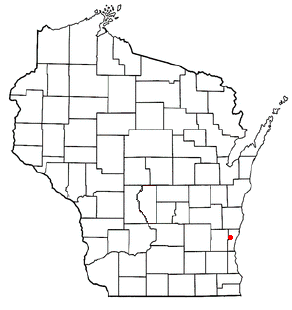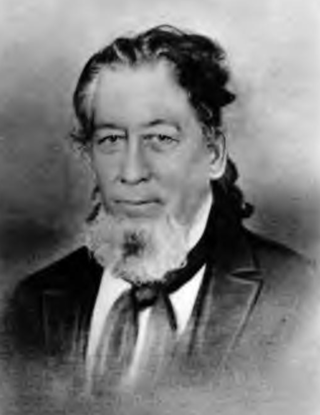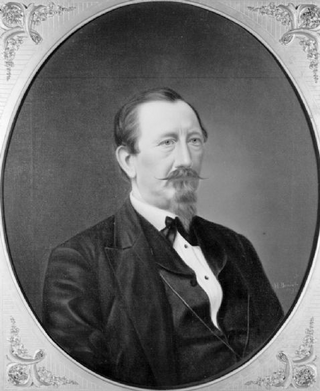Related Research Articles

Ozaukee County is a county in the U.S. state of Wisconsin. As of the 2020 census, the population was 91,503. Its county seat is Port Washington. Ozaukee County is included in the Milwaukee–Waukesha–West Allis, WI Metropolitan Statistical Area.

Port Washington is a town in Ozaukee County in the U.S. state of Wisconsin. It surrounds the northern and western side of the city of Port Washington. As of the 2020 census, the town population was 1,538. The unincorporated communities of Druecker and Knellsville are also located in the town.

Port Washington is the county seat of Ozaukee County in the U.S. state of Wisconsin. Located on Lake Michigan's western shore east of Interstate 43, the community is a suburb in the Milwaukee metropolitan area 27 miles (43 km) north of the City of Milwaukee. The city's artificial harbor at the mouth of Sauk Creek was dredged in the 1870s and was a commercial port until the early 2000s. The population was 12,353 at the 2020 census.

Saukville is a town in Ozaukee County, Wisconsin, United States. The Village of Saukville is located in the town's southeast quadrant. The population was 1,755 at the 2000 census.

Alexander Botkin was an American lawyer, politician, and pioneer settler of Dane County, Wisconsin. He served one term each as a member of the Wisconsin Senate and Wisconsin State Assembly.
Parker Warren was an American farmer from Beaver Dam, Wisconsin who served a one-year term in 1849 as a Free Soil Party member of the Wisconsin State Assembly from Dodge County.
James Rolfe was an American farmer from Polk, Wisconsin, who spent a single one-year term in 1855 as an independent member of the Wisconsin State Senate from the 4th District.

Frederick William Horn was a German-American immigrant, lawyer, politician, and Wisconsin pioneer. He served in many elected offices; he was the 4th, 7th, & 25th speaker of the Wisconsin State Assembly, and served a total of 14 years in the Assembly. He also served five years in the Wisconsin State Senate—including the first three sessions after statehood—and was the first mayor of Cedarburg, Wisconsin, serving seven years in that role. He generally identified as a Democrat, but was elected several times as an Independent.
AdolphusZimmermann was an American brewer and politician from Mequon, Wisconsin.
Joseph Turner was an American farmer, Democratic politician, and Wisconsin pioneer. He represented Waukesha County in the Wisconsin State Senate during the 1st Wisconsin Legislature (1848). Two of his sons were also Wisconsin legislators.
Eugene S. Turner was an American jurist and legislator.
Harvey Griswold Turner was an American lawyer, politician, and judge. He served two years in the Wisconsin State Senate, representing Washington County, and five years as county judge of Ozaukee County. He was also the youngest delegate to Wisconsin's 2nd constitutional convention, which produced the Constitution of Wisconsin in the Winter of 1847–1848.
William H. Johnson was an American politician and farmer from Fort Atkinson, Wisconsin who spent a single one-year term as a Democratic member of the Wisconsin State Assembly from Jefferson County during the 1849 session, succeeding fellow Democrat Ninian E. Whiteside.
Chauncey Moss Phelps was an American farmer and politician who held office in two counties, as well as in the legislatures of the Territory and State of Wisconsin.
Patrick Toland (1801–1858) was a farmer from Erin, Wisconsin who served a single one-year term as a Democratic member of the Wisconsin State Assembly from Washington County and held other public offices.
Peter Turck often misspelled Turek was an American farmer from Mequon, Wisconsin who served a single one-year term as a member of the Wisconsin State Assembly.
James Fagan was an Irish American immigrant, farmer, and Wisconsin pioneer. He was a member of the Wisconsin State Assembly, representing Washington County during the 1849 and 1857 sessions. He earlier served as a delegate to Wisconsin's second constitutional convention, which produced the Constitution of Wisconsin.
Jabez Pierce or Peirce was a carpenter and miner from Mineral Point, Wisconsin who served a single one-year term as a Democratic member of the Wisconsin State Assembly for 1849.
Davis Gillilan or Gillilian was an American merchant, miner and politician from Dubuque, Wisconsin Territory and Potosi, Wisconsin, who held various elected offices in Dubuque and served a single one-year term as a Democratic member of the Wisconsin State Assembly from Grant County.
Paul Juneau was a businessman from Theresa, Wisconsin who served two one-year terms in the Wisconsin State Assembly in 1849 and 1858 as a Democratic representative from Dodge County.
References
- ↑ State of Wisconsin Legislative Reference Bureau. "Members of the Wisconsin Legislature 1848–1999". Information Bulletin 99-1 (September 1999), p. 67
- ↑ "No. 79. In Bankruptcy. In the Supreme Court of the Territory of Wisconsin", Wisconsin Enquirer Madison; April 25, 1842; p. 3, col. 6
- ↑ Price, Sister Mary Jane Frances SSND The history of Port Washington, in Ozaukee, Wisconsin Chicago: De Paul University, 1943; p. 15, 20
- ↑ Montalto, Suzanne M.? Port Washington 1835 to 1985 Port Washington, Wisconsin: Port Publications, 1985; p. 6
- ↑ Cole, Harry Ellsworth (edited by Louise Phelps Kellogg). Stagecoach and Tavern Tales of the Old Northwest Cleveland: Arthur H. Clark Company, 1930; p. 289
- ↑ Price, pp. 19-20
- ↑ Milwaukee Sentinel p. 2, col. 2
- ↑ Solon loses Senate to Horn, Southport Telegraph May 12, 1848; p. 2, col. 5, via newspapers.com
- ↑ "List of Members of the Assembly of the State of Wisconsin" Wisconsin Express January 30, 1849; p. 4 via Newspapers.com
- ↑ "Legislative. Standing Committees of the Assembly." Waukesha Democrat January 23, 1849; p. 2, col. 4
- ↑ Democratic State Register November 18, 1850; p. 2, col. 5
- ↑ History of Washington and Ozaukee Counties, Wisconsin: containing an account of its settlement, growth, development and resources; an extensive and minute sketch of its cities, towns and villages--their improvements, industries, manufactories, churches, schools and societies; its war record, biographical sketches, portraits of prominent men and early settlers; the whole preceded by a history of Wisconsin, statistics of the state, and an abstract of its laws and constitution and of the constitution of the United States Chicago: Western Historical Company, 1881; p. 543
- ↑ "An Explanation" The Butte Miner March 27, 1881; p. 3, col. 1
- ↑ "Obituary. An Old-Timer Passes On to Join the Silent Majority" The Butte Miner November 21, 1886; p. 6, col. 2
- ↑ The Butte Miner February 19, 1887; p. 3, col. 6